Perhaps you know one: the heroes among us who work tirelessly in the trenches on behalf of families. Driven by love, compassion and an acute sense of responsibility, these people — we call them “Superheroes” — give from a seemingly bottomless well of their time, talent and money with one goal in common: building a better world for our children. Superheroes tease out solutions for kids in need, build foundations for better lives, inspire those without hope and offer support for those who are sick, tired or just need one small break.
This year, we honor 11 people who stick their necks out for local families. Our 2011 Superheroes lift us all up, because they lift up the most vulnerable among us. We hope you’ll be inspired by their stories and maybe even get involved, write a letter or make a donation — or just say a quiet word of thanks.
Superheroes, we salute you!
Meet our 2011 Superheroes
- The crusader: Dan Savage
- The champions: Sebrena and Rena Mateja Burr
- The advocate: Michael Schindler
- The mentor: Shandra Benito
- The activists: Estela Ortega and Roberto Maestas
- The educator: Karen Kodama
- The healer: Dr. Beth Harvey
- The community builder: Ron Sher
- The angel: Rebecca Mallos
- The counselor: Mike Heinisch
- The role model: Karen Bryant

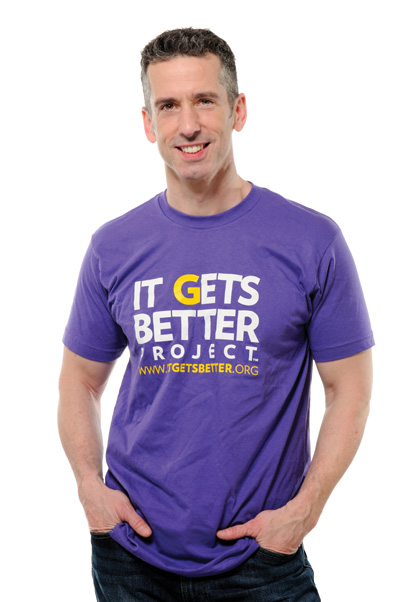
Dan Savage is throwing out a lifeline to thousands of young people struggling with their sexual identity. Check that: He is throwing out thousands of lifelines.
Savage's It Gets Better Project links users to more than 10,000 YouTube videos in which successful, happy adults assure lesbian, gay, bisexual and transgender (LGBT) youths that a better life awaits them beyond high school; a future where they can live, love and work as openly gay adults.
Tragic stories of gay teens killing themselves last fall compelled Savage and his partner to act. Six months later, the Seattle editor and author admits to being stunned by the website’s enormous, worldwide support. “We are delighted by the celebrities’ and politicians’ involvement,” says Savage. “But as important in the aggregate are the videos from everyday people showing that life ahead can be fabulous.”
LGBT youths often face torment at school, and Savage urges parents to help. “A lot of parents believe they can change kids by rejecting them, and that’s just wrong.”
He adds that watching the videos together can be a shared experience, even for supportive parents. “With the videos, this hard topic becomes a bank-shot conversation, not a direct conversation.”
The website also directs teens in crisis to The Trevor Project, the only nationwide suicide prevention hotline for LGBT youths. That group’s executive director, Charles Robbins, credits Savage’s site with directing young people to the crisis line, possibly saving lives. “There’s a critical mass being reached, a sort of cultural shift, and Dan’s work is allowing the country to come together in a positive way.” — Hilary Benson
Get to know Dan Savage...
Personal hero: My mother.
Pet peeve: Anything another person might be doing that could possibly interfere in any way with whatever it is I happen to be doing — that’s vague and broad, I realize, but I have a lot of pet peeves, and picking just one would be like playing favorites.
Best recent read: Sex at Dawn: The Prehistoric Origins of Modern Sexuality by Christopher Ryan.
Best way to get kids involved in giving back: By setting an example — by giving and trusting that your kids will emulate your example. Don’t force ’em.
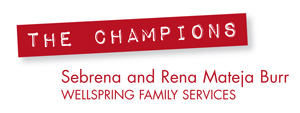
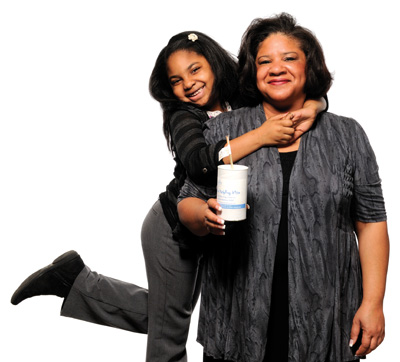
They’re a powerful mother-daughter duo, a force to be reckoned with when it comes to helping low-income and homeless children in Washington. Sebrena often takes her case to state legislators, working for change at the policy level. Her 7-year-old daughter, Rena Mateja, is best known for her grassroots work collecting pennies to assist homeless youth through Wellspring Family Services.
Rena Mateja’s fundraising abilities are legend. She recently went door to door, collecting $506 in loose change to help homeless children. Then, via video, Rena Mateja requested that 1,000 attendees at Wellspring’s Powerful Change luncheon also give $506. Of those present, 110 each donated that amount, raising a total of $55,660.
Now the first-graders at Rena Mateja’s school, South Shore PreK-8 in Rainier Beach, are collecting coins for Wellspring’s Kids Helping Kids campaign. Her work has not gone unnoticed. In honor of Rena Mateja, local kids’ performer Caspar Babypants wrote a song called “Happy Heart,” which challenges kids to be more like Rena Mateja.
“Rena Mateja and Sebrena are proof that all of us have the power to affect the change we wish to see in our community,” says Patricia Gray, community relations manager at Wellspring. “Sebrena dedicates every waking hour to improving the lives of vulnerable children and families in our community.
“After Rena Mateja sets and accomplishes one goal, she simply moves on to set another, astonishing us all over again,” says Gray. “She’s a 7-year-old on a mission.” — Karen Dawson
Get to know Sebrena and Rena Mateja Burr...
Personal hero: Roxana Norouzi
Pet peeve: People who do not recognize an individual’s disability because it is not visible to the eye, and meanness and cruelty towards children of all kinds.
Best recent read: The Stolen Ones and How They Were Missed by Marcia Tate Arunga
Best way to get kids involved in giving back: Teach them to advocate with you. When they have an idea, help them to make it happen. Show them ways they can make a difference from right where they are. When they do something to help others, praise them and let them know you are proud of them and their actions.

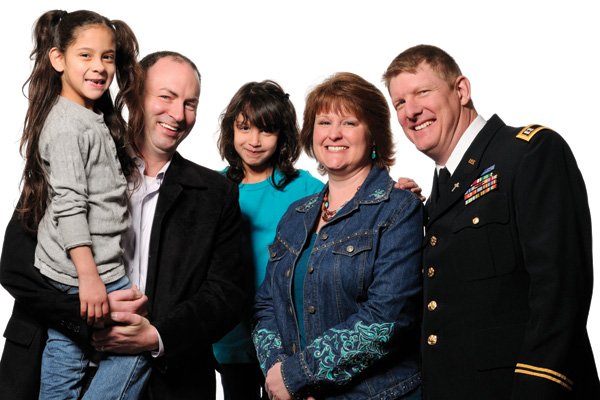
Michael Schindler teaches his two young daughters to find ways to “add value to people’s lives.”
A living example of what he calls his “family motto,” Schindler is adding value, learning and compassion to thousands of lives every day as founder of Operation Military Family (OMF), an organization based in Edmonds that develops strategies to strengthen military marriages and families.
Schindler, a motivational speaker and author of Operation Military Family: How to Strengthen Your Military Marriage and Save Your Family, also runs a website, operationmilitaryfamily.com, and relationship seminars, events, and programs for military families.
A Navy veteran, Schindler founded OMF in 2006 after his friend was deployed to Afghanistan. “I wanted to show how the military rips marriages apart,” he says. “Then I realized I’d get the military’s participation if I focused on helping keep families together. I soon became the guy who knew everything about military marriages."
In Schindler’s book, he reports that when a spouse goes off to war, 20 percent of marriages fall apart within two years. Schindler would like to see that pattern end.
With that goal in mind, OMF is expanding its mission to help solve other problems military families deal with, such as delays in veteran benefits, and housing and health issues. Schindler says, “If we help with those things, we help strengthen relationships.” — Linda Morgan
Get to know Michael Schindler...
Personal heroes: Ronald Reagan. Here’s a man who started on one set of beliefs, then grew his viewpoint. Someone who is open-minded like that is impressive. Also, my wife. We’ve been through a lot. She holds down the fort and puts up with me.
Pet peeve: I live in a houseful of girls. It’s full of toilet paper that never gets replaced.
Best recent read: Crossing the Chasm by Geoffrey A. Moore
Best way to get kids involved in giving back: Find something in the community that is going to add value to someone else’s life. And be honorable and kind.
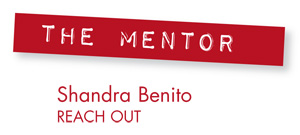
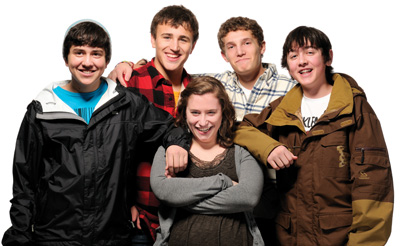
Last summer, 19-year-old Shandra Benito — with the help of Ashoka’s Youth Venture — founded Reach Out, an organization that runs summer camps and programs for children at Abused Deaf Women’s Advocacy Services (ADWAS).
It was just the latest in a long list of accomplishments for Benito, who led the trumpet section in the Roosevelt High School marching band before moving on to Seattle University, where she was honored with the prestigious Sullivan Leadership Award. She also has served as a Teens in Public Service intern at the Ballard Food Bank, tutored students in low-income areas and given music lessons in schools where music programs have been cut. Benito accomplished all this after being diagnosed with hearing loss at the age of 2.
“Having a young, energetic, hard-of-hearing woman leading great activities for our kids, educating our larger community about experiences around domestic violence in deaf, deaf-blind, and hard-of-hearing communities, and coordinating activities we might not otherwise have the resources to run makes a huge impact on the experience of the kiddos we work with,” says Sadie Pile, the children’s advocate at ADWAS. “Shandra’s motivation to provide this opportunity for them had a fantastic impact. Kids are still, months later, asking about the mentor-friends they made that week, and their world has expanded a little.” — Kathleen F. Miller
Get to know Shandra Benito...
Personal hero: My dear friend Michael Wiley. His friendship completely changed my life and inspired me to want to do the same for others. He is currently serving in the Peace Corps in Azerbaijan, and is one of the wittiest and wisest people I know.
Pet peeve: The word “sure” — it’s so noncommittal, it drives me nuts!
Best recent read: Maya Angelou’s I Know Why the Caged Bird Sings.
Best way to get kids involved in giving back: Do what you love! There are a million ways to get involved with the communities around you doing what you love, whether it’s giving music lessons, coaching or providing free art classes. There’s no one right way to make a difference.

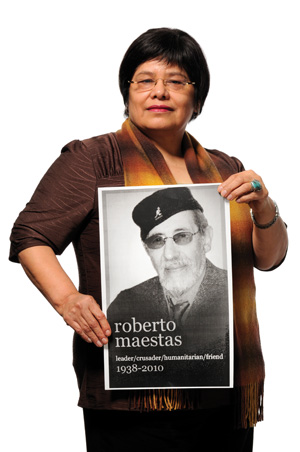
It has been quite a year of highs and lows for Estela Ortega, who lost her beloved husband, Roberto Maestas, last September. Maestas was the cofounder and longtime director of El Centro de La Raza, and a nationally recognized advocate for social justice. In February, Ortega, now the executive director of El Centro, was honored by Sens. Maria Cantwell and Patty Murray as a 2011 Woman of Valor.
El Centro de La Raza (The Center for People of All Races) was born in 1972, when a group of activists led by Maestas occupied the abandoned Beacon Hill School, eventually transforming it into a community center for the Latino and Chicano community. Since then, El Centro has offered a wide array of services, including a youth program, emergency service center, hot meal program, food bank, and an education and skill-building program.
Maestas began life as the youngest child of 17 in a small farming community in northern New Mexico. He worked in fields and orchards along the “migrant trail” to Colorado, then traveled to Seattle, where he worked his way through the University of Washington. Ortega says that Maestas never forgot the struggles of his youth. “Poor people were always very important to him.”
Maestas was a member of Seattle’s famous “Gang of Four,” which founded the influential Minority Executive Director’s Coalition in the 1980s. The group united the Asian-Pacific American, African-American, Native American and Chicano-Latino communities in advocacy for people of color. His work touched the lives of young and old.
“Many times, our program works with youth who have decided to fight on behalf of a gang and represent that as their only way of life,” says Alex Bautista, coordinator of El Centro’s youth program. “Roberto, through his example, showed youth that they don’t have to lead a life as a gang member, but instead fight for the community and build alliances with others rather than creating enemies. I look up to Roberto today. Even though he is no longer here with us physically, his memory and legacy is alive and well.” —KFM
Get to know Estela Ortega and Roberto Maestas...
Maestas’ personal heroes, per Ortega: His abuelo [grandfather] Isidoro Vigil for his love, wisdom, spirit of giving, patience and optimism. Roberto would often quote his grandfather, who said, “There is nothing so bad that you cannot find the good in it.” Also, his tio [uncle] Arturo, who was in many ways a father figure to him. Arturo was killed in the Korean War. His community hero was Dr. Martin Luther King Jr., whose message of unconditional love, multiracial unity and the beloved community were lessons that were always a part of Roberto’s speeches and talks. To some degree, his older brother Francisco, although he would never admit it to him, for providing an example of confidence and success to him.”
Pet peeve: He continually picked up after me. I had a bad habit and still do of not hanging up my coats, scarves, leaving my clothes on the bed or a chair. He would just put my things away or hang them up and he would tell me, “You don’t like to put away your things!” It bugged him, but he patiently picked up after me.
Best recent read: Don Quixote by Miguel de Cervantes.
Best way to get kids involved in giving back: He would say through example, fostering compassion through unconditional love, teaching them about our shared humanity. Validate them as special and capable. Teach them to find the beauty in everything.

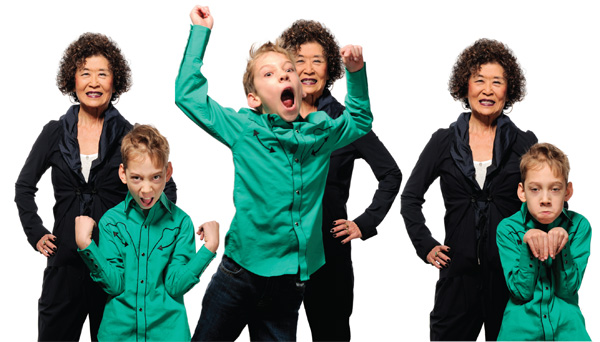
Karen Kodama wishes she had learned Japanese from her grandmother. It’s a little ironic, given her role as the international education administrator for Seattle Public Schools. Kodama began her career education in 1970 as an elementary school teacher and eventually served as the founding principal of the John Stanford International School. Now, she’s in charge of the expansion of international education in Seattle’s public schools. Inspired by the vision of the late superintendent John Stanford, her goal is to eventually create 12 international schools. Graduates of the schools will have the skills to succeed in the global economy of the future, with cultural competency, academic excellence and fluency in a second language.
“Karen has not only been an advocate for global education, in all of its facets, but also a staunch supporter for such educational opportunities for all children,” says Susie Murphy, Ph.D., the principal of the Beacon Hill International School.
Murphy recalls watching Kodama demonstrate her global citizen skills on a recent trip overseas. “I had the good fortune to travel to China with Karen recently. She represented Seattle Public Schools as our spokesman to the Confucius Institute. She was, indeed, speaking on the global stage. She was eloquent and passionate. Our Chinese hosts were impressed and thrilled.” — KFM
Get to know Karen Kodama...
Personal heroes: My parents, who were my role models for working hard, and the late John Stanford. He was a visionary leader who taught us all to think outside of the box.
Pet peeve: People who are always late.
Best recent read: Stieg Larsson’s The Girl with the Dragon Tattoo, Tony Wagner’s The Global Achievement Gap: Why Even Our Best Schools Don’t Teach the New Survival Skills Our Children Need — And What We Can Do About It.
Best way to get kids involved in giving back: Teach children that they can make a difference in the world, locally and globally. Demonstrate different ways of helping. Kids must feel that they can make a difference in the world.
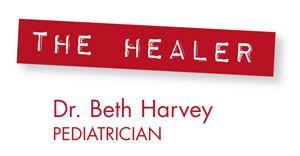
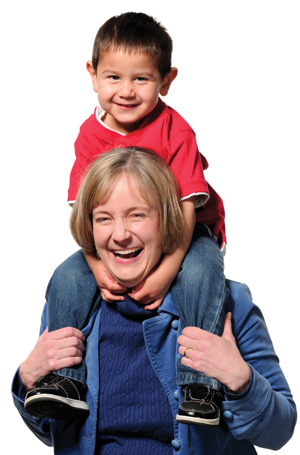
Beth Harvey knew she wanted to be a pediatrician when she was in the third grade — lucky for the children of Washington. Harvey, a native of Olympia, completed her medical education in Kansas City and her residency in Salt Lake City. Then she returned to Washington to join the practice that had cared for her as a child. “I always connected with kids,” she says. “I enjoyed the idea of treating somebody from being a baby to being an adult.”
As president of the Washington Chapter of the American Academy of Pediatrics in 2009, Harvey faced an immediate challenge: The state budget crisis threatened the 15-year practice of providing vaccines for every child in the state.
Working with insurance companies, legislators and others, Harvey helped develop a program, modeled after those in other states, for insurance companies to pool funds to pay for the vaccines. Today, Washington state is one of only six states that provide access to vaccines for every child from newborn to 18 years old.
State Rep. Eileen Cody, who worked with Harvey on the project, describes her as “the little engine that could. She has all the energy in the world and she never gives up.”
Harvey credits the 80 people who worked on the project. “Everyone’s focus was only on the kids — what can we do to protect the kids? How can we protect them from dying from preventable diseases?” — Elaine Bowers
Get to know Dr. Beth Harvey...
Personal heroes: Cynthia Shurtleff and Laurie Lippold, two of Washington state’s most committed and skilled child advocates.
Pet peeve: Distracted drivers.
Best recent read: The 2010 Best American Short Stories, edited by Richard Russo.
Best way to get kids involved in giving back: We try to shift our son’s focus from material desires to generosity at times when he is the focus (like birthdays and holidays). This leads to conversations about our values and how we can help others. I also encourage my son to go through his things periodically and donate them to my office for kids who don’t have enough.

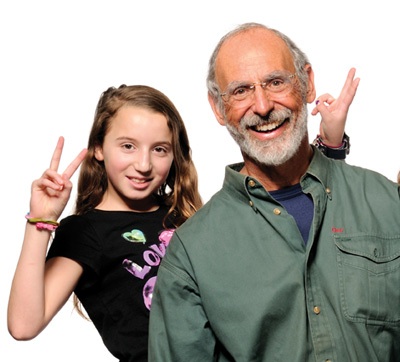
He’s a successful developer and the creator of vibrant local retail community centers, including Crossroads Shopping Center in east Bellevue, and Third Place Books and Third Place Commons at Lake Forest Park Towne Centre. The 68-year-old Bellevue grandfather also earned a Ph.D. in agricultural economics from Washington State University. He bikes thousands of miles each year and describes himself as an environmentalist. He says when he was young, he learned, “People should respect each other and treat each other well.”
In a time of an abundance of empty retail spaces, Sher is still building community, recently landing a large new tenant for Crossroads: Stone Gardens, an indoor gym for climbers. He’s also transforming the old J.C. Penney building in Bremerton into a new residential and retail center.
“My work is inspired by Ron’s approach that being a good community steward can also be good business,” says Karen True, a community engagement consultant and Sher’s friend and frequent collaborator. “He is a community builder, creating places where children and families can discover ways to participate in their communities. Families can have fun without spending lots of money and experience firsthand what it means to be a part of a thriving, respectful community.” — KFM
Get to know Ron Sher...
Personal heroes: Lawyer and civic activist Jim Ellis, founder of Preston Gates & Ellis and “father” of Metro, the Lake Washington cleanup campaign and the Forward Thrust public works program. Sidney Harman, the 93-year-old new owner of Newsweek and innovative business leader and social activist.
Pet peeve: People who only think of themselves.
Best recent reads: Bob Woodward’s Obama’s Wars and Ray Oldenburg’s The Great Good Place.
Best way to get kids involved in giving back: Modeling how you wish them to serve their community by volunteering with them.

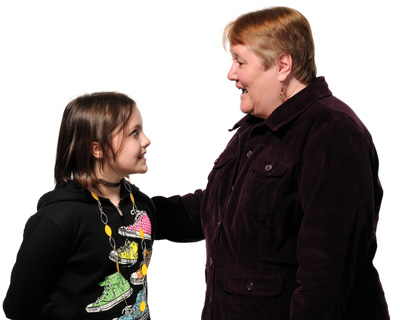
When families with adopted children struggle, traditional therapy rarely works. Rebecca Mallos, a founder of Attachment and Trauma Specialists, heals these families by helping adoptive parents become a trusted safety net.
“Parents are desperate by the time they get to us,” says Mallos, who usually sees families after they have tried several other therapists. “They feel like nobody else understands.”
She describes herself as a facilitator, rather than a fixer of children who often come from backgrounds of abuse or neglect. Traditional therapy involves treating the child alone, and that approach can fail to forge a bond between the child and adoptive parents.
For client Ann Lokey, whose daughter was “headed down a path of destruction” when she came to Mallos, traditional therapy had been a “road map to nowhere.” Instead, Mallos taught the family therapeutic parenting, which brings parents into the fold. “It not only touched my child’s grief, but included me, so that I could become the soft spot for my daughter to land in,” says Lokey.
With more than 30 years of experience, Mallos often treats families off and on throughout the child’s life. She is reality oriented, says Lokey, not allowing a child to fantasize about who the birth parents are. “She helps them understand that this bad thing happened to them before, but that they can move on and be a part of a loving family.” — HB
Get to know Rebecca Mallos...
Personal heroes: The children I work with. They are very brave to risk trusting.
Pet peeve: Seeing parents on an outing, like at the zoo where I have volunteered, and rather than interact with their children, they are on the cell phone.
Best recent read: The Warmth of Other Suns by Isabel Wilkerson. It’s about the migration of rural African-Americans in the South to the northern and western states. It’s told from the personal experience of people who made that migration. Very interesting! Reminds me of the children I work with. They migrate as well.
Best way to get kids involved in giving back: I believe it has to begin very early and be something the family does together and is a family expectation, just like any other expectation. I did this with my children when they were growing up, and now, as adults, they all give to their communities in some way, because it is just part of who they are.

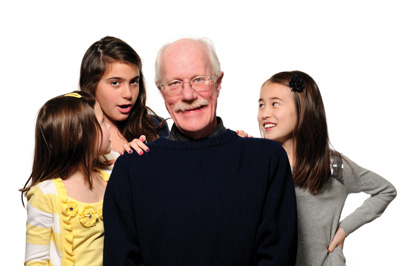
Mike Heinisch moved to Seattle from Wisconsin to make a life for himself. In the process, he has changed the lives of countless local families.
Heinisch has always been drawn to working with families in need, so he earned a master’s degree in counseling from Seattle University. “I saw that when kids have the support they need and families have the support they need, they can begin to thrive,” he says.
Now in his 12th year as director of Kent Youth and Family Services (KYFS), Heinisch has seen huge changes in the community. Affordable housing has brought a big influx of immigrants and outmigration from Seattle. Many of these families seek counseling, education and support services from KYFS.
Steve Strachan, chief deputy of the King County Sheriff’s Office, describes Heinisch as “one of the most truly caring and compassionate individuals I have ever met, personally or professionally.”
There are paybacks. Heinisch recalls meeting the parents of a young woman who had come through KYFS years earlier with myriad problems, including drug addiction. “You gave us our family back,” they told him.
Heinisch is a bit sheepish about being named a superhero. “I wouldn’t be a superhero unless I had a hundred people here who are also superheroes.” — EB
Get to know Mike Heinisch...
Personal hero: My father. I’ve never met someone more true to his word.
Pet peeve: I don’t think I have one.
Best recent read: Team of Rivals: The Political Genius of Abraham Lincoln by Doris Kearns Goodwin.
Best way to get kids involved in giving back: Taking them along and making them a part of when we’re giving back.
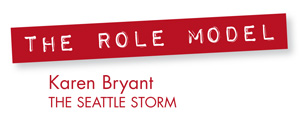
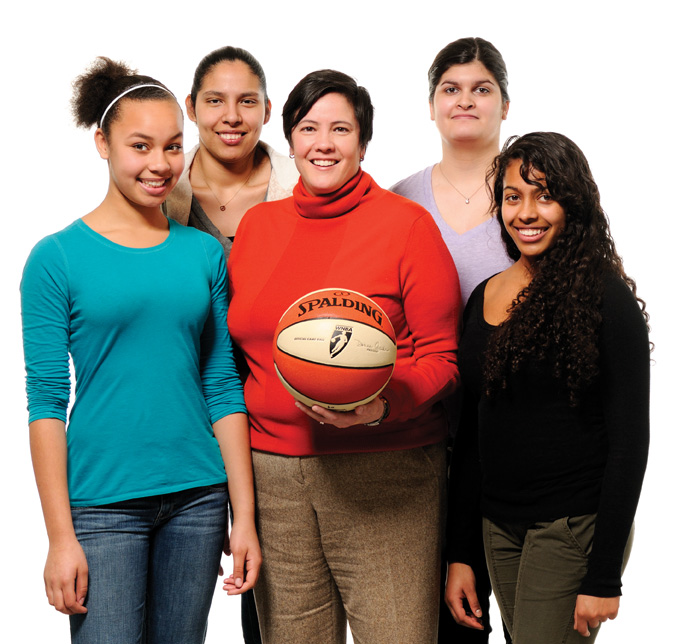
For Seattle Storm CEO Karen Bryant, it’s all about impact, whether she’s leading her team to its second WNBA championship or reaching out to inspire girls. “It’s so important,” says Bryant. “I’ve been so fortunate in my life to have so many great adults supporting me, starting with my parents and all my coaches.” Now, Bryant, an Edmonds native and former standout college athlete, is doing all she can to do the same. “I know how impactful it is to a young girl to have adults who invest in their growth and development.”
Bryant is the backbone — really, the heart and soul — of professional women’s basketball in Seattle, serving first as head of the now-defunct Seattle Reign and now running the Seattle Storm. But when she’s not building a successful basketball franchise, she’s quietly working in very personal ways to better the lives of local kids. Bryant has served on the boards of King County Sexual Assault Resource Center and Girl Scouts USA. Currently, she’s on the board of the Boys and Girls Clubs of King County. In February, she was honored as a Girl Scouts’ Woman of Distinction for her influence in the community.
“Karen is a wonderful role model to kids,” says Dawn Trudeau, the chairperson of Force 10 Hoops LLC, which owns the Storm. “Not only in her personal achievement through hard work and commitment, but also in the potential she highlights to our community through the variety of ways that kids are featured during Storm games.
“Karen exemplifies that anything is possible if you believe in yourself and your dreams.” —Kristen Russell
Get to know Karen Bryant...
Personal heroes: My mom. I’ll always remember her just doing it all — she was a wife, a mother to three, a sister to 16 and a career woman. She was able to balance all of that remarkably well, and I don’t remember her ever complaining. She’s a very resilient and strong woman.
Pet peeve: Dog owners who don’t pick up after their dogs.
Best recent read: Blink: The Power of Thinking Without Thinking by Malcolm Gladwell
Best way to get kids involved in giving back: Model the behavior and invite them to participate with you, which also opens a dialogue.









